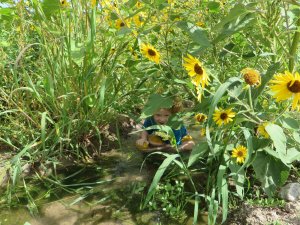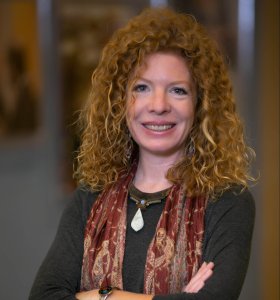 We are delighted to share reflections from ESHIP Rio Grande Local Director and co-owner of Ancient Waters Farm, Erin Ortigoza. Erin has been leading the ESHIP Rio Grande work since the Fall of 2019 and has been a dedicated member of New Mexico’s food economy ecosystem for fifteen years. She’s also a dynamic storyteller, community connector, impactful advocate, deep listener, farmer, and intuitive healer. Erin is passionate about facilitating collective work supportive to a rich and resilient entrepreneurial environment for the food and agricultural community of New Mexico and she brings to her work a centeredness and quiet clarity that honors the needs and gifts of the people, land, animals, and plants that make up her regional ecosystem. Make sure to check out the full Deep Dive with Entrepreneurial Ecosystem Builders Across ESHIP Communities series including our interviews with Kena Fuller and Paulo Gregory.
We are delighted to share reflections from ESHIP Rio Grande Local Director and co-owner of Ancient Waters Farm, Erin Ortigoza. Erin has been leading the ESHIP Rio Grande work since the Fall of 2019 and has been a dedicated member of New Mexico’s food economy ecosystem for fifteen years. She’s also a dynamic storyteller, community connector, impactful advocate, deep listener, farmer, and intuitive healer. Erin is passionate about facilitating collective work supportive to a rich and resilient entrepreneurial environment for the food and agricultural community of New Mexico and she brings to her work a centeredness and quiet clarity that honors the needs and gifts of the people, land, animals, and plants that make up her regional ecosystem. Make sure to check out the full Deep Dive with Entrepreneurial Ecosystem Builders Across ESHIP Communities series including our interviews with Kena Fuller and Paulo Gregory.
Ecosystem Building
Q: What is your personal definition of an ecosystem builder?
A: An ecosystem builder is a person who builds bridges in community deeper than logical connection by reading the big picture, working in the weeds, and cultivating the spaces in between for fertile opportunity. This is someone who is adept at knowing themselves first, and through their wisdom and lived experience of orienting in time, place, and community, can create fortuitous pathways, wield synchronicity, and anchor heart-centered relationships as investments in a dynamic thriving entrepreneurial landscape.
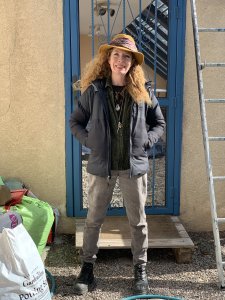 Q: How would you describe a truly healthy and equitable entrepreneurial ecosystem?
Q: How would you describe a truly healthy and equitable entrepreneurial ecosystem?
A: A healthy and equitable entrepreneurial ecosystem is grounded in reciprocity and respect for all folks in the relationship. Where values encompass and transcend “the transaction”, this sets the stage for satisfaction and trust. Balance in exchange is important for people to feel seen and valued for their work and gifts offered. When a critical mass of people are feeling satisfied, valued, and productive by working together in a collective, a shared understanding grows that can inform resilient practices to better withstand systemic pressures. I believe reciprocity is a powerful component that supports emerging health and equity to evolve in resonance with the needs and brilliance of a given community.
Q: Tell us about a time you witnessed people helping each other in your ecosystem. How did that inspire or motivate you?
A: I could write a book on this topic! And actually, an entire publication was designed around it; so I would like to share the preface I wrote for the September/October 2020 edition of the Green Fire Times Growing a Regional Food System. I invite you to explore the many voices that combine to tell this story through their articles.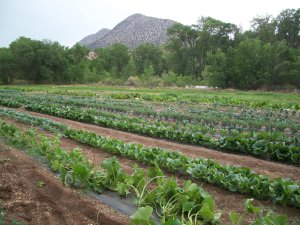
The September-October 2020 Green Fire Times- Growing a Regional Food System— is a tribute to the people of New Mexico. The Life, work, heart and soul reflected in these pages demonstrates the strength and hope alive in our communities.
The stories link system-level concepts with entrepreneurial and community experience. They speak to the food value chain and what that means to us as we seek to co-create a revolutionary and resilient systemic response to the culmination of these times. We witness shifts that have happened through the eyes of the many contributors, and are also made aware of changes that are still needed to rebuild our regional food system. There is a new order developing. Equitable access through the localization of agriculture rings loud and clear.
These articles explore the specifics of various organizations’ and food/agricultural entrepreneurs' journeys and what it takes to work with mission, purpose and passion through unprecedented challenges. The tenacity showcased underlies work borne out of collaboration amongst groups, some which have built bonds over many years and some that are discovering new ways of working together.
We are reminded that food is essential to being in alignment with our ancestors and environment. We are also ancestors for our future kin; the way that food is grown today lays the groundwork for that future.
Q: Tell us about a moment in your life that helped make you a better ecosystem builder.
A: I call it the tomato graveyard. It was a summer day in 2013 and I was on my way home after a round of very intense thunderstorms over the mountains of Northern New Mexico. As I rounded the bend, our valley fields came into view and I immediately knew there was a problem. The stormwater runoff had overflowed from the arroyo near our fields and our entire tomato crop, which had been brimming with red, ready to harvest beauties, was swamped, buried deeply in arroyo silt; froth still bubbling from the force of the water’s descent. Our new farm took a heavy loss that day and I can still see the red fruit peeking out from below the newly displaced topsoil.
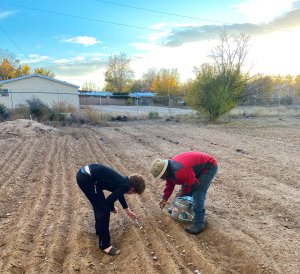
While we were able to salvage some of that crop and had other successful harvests that first year, I remember the feeling of isolation and confusion while trying to piece together resources to support our livelihood. That was when I decided that there must be a better way for connections to be built that agricultural entrepreneurs could rely upon for the many twists and turns that life takes on the journey of producing food in rural New Mexico. That moment continues to shape my life and work and inspires me to go beyond my comfort zone, building bridges in our food and agricultural ecosystem to support those whose passion it is to grow food.
Community Navigator Project
Q: What is the pilot project you are working on?
A: NM grown food is an essential part of life in our beautiful state. Increasingly we are seeing how the strength of our food community is an asset worthy of investment and collective attention, in order to provide for our future health, vitality, and resilience.
Farmers across New Mexico have identified multiple areas of potential growth within our regional food system. Creating equitable and inclusive access to agricultural and small business resources that support growers is crucial to deconstruct the legacy of food commoditization that defines our current extractive and exportive food system.
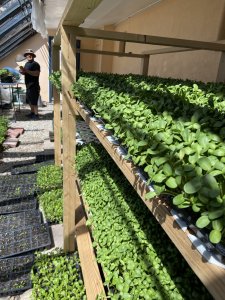
This past winter, ESHIP Rio Grande initiated a Food Community Navigation project to engage with approximately 20 rural growers in two distinct regions of the state - Pueblo of Zuni/Navajo Nation and North Central NM. Food Community Navigators were hired to work with farmers and ranchers in each region and build bridges for them to better access organizations that provide agricultural resources. This work aims to increase opportunities for nutrient dense, culturally appropriate food to be grown and circulated within our state by supporting NM farmers!
Participants in the cohorts were invited to engage one-on-one with a Food Community Navigator to collaborate around their specific needs and connect with resource providers. The timeline for this pilot extended through April 30th and we are supporting transitional services through June 20, to get cohort participants as situated as possible in working with the resource providers in their current focus area. We are also designing a storytelling campaign to be launched in this time frame. This would be an opportunity for a site visit to each of the farms/ranches participating in and would be more focused around reflection on the navigation process than direct services.
Q: What will need to happen in order for you to know the pilot project you are working on has been successful? What are your hopes, visions and dreams for this project?
A: We strongly believe that this project has provided benefit for farmers and ranchers in rural and sovereign agricultural communities and demonstrates how the work of food community navigators is very important as we evolve our local networks and the ways we produce and consume food in this state. We have heard from the navigators that they see this work and their role as key in helping farmers and ranchers move past “awareness” of resources and services, to actually applying for or activating those resources on their land.
In a similar vein, we have heard that the service providers typically have limited capacity to conduct broad outreach about their programs and have found it very helpful to work with the navigators, who are prepping the farmers and ranchers and supporting specific proposals or points of inquiry to begin working from. One of our navigators shared that she hopes to see the work “continue in places like this who are underserved, not united, and largely ignored. Without this program, I don’t think anything like this collaboration would have occurred, and despite the challenges, I believe it is precious and unprecedented.”
We have designed 4 specific steps as a methodology for rural food community navigation with the final stage being “Satisfaction”. That is to say that upon completion of the engagement, we gauge our success if the agricultural entrepreneur can reflect on where they were prior to services and are happy with the results of the process and any incremental progress toward their long term vision for their farm and/or ranch’s vitality through: tangible asset exchange, information/idea exchange, new services being acquired, or the emergence of ecosystem level connection/networks and enduring relationships. My hope for this project is that the culture of reciprocity becomes a keystone foundation from which people in a variety of roles in the ecosystem offer what they can into the community, are empowered to ask for what they need, and that exchange of any kind results in a sense of balance and shared commitment to one another.
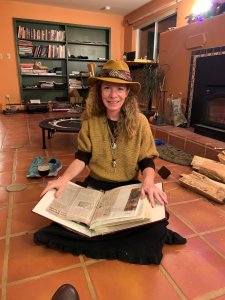
Q: What do you and your ecosystem need to support the success and sustainability of this pilot project? What do you need right now to take this project to the next level?
A: We would like to see Food Community Navigation Services become a long term program that supports seasonal cohorts throughout the state of New Mexico. What we need is a home for this program and currently have some very good options for advancing toward that goal. We are working to leverage our accomplishments and learnings by aiming for such a cohort to begin again in October of this year, with programmatic preparation running throughout the summer.
We have heard from our navigators that as the world of resources and services is so dynamic and fast paced, it will be important to stay abreast of new opportunities for farmers and continue to cultivate relationships with resource providers and the staff in agencies and other organizations who are advocating for equitable access to their services. In this build out of the program, we seek to work with our initial navigators to provide mentorship for others interested in this line of work, in order to build an eventual community of practice and culture of navigation services for agricultural entrepreneurs.
Entrepreneurship
Q: What is your business?
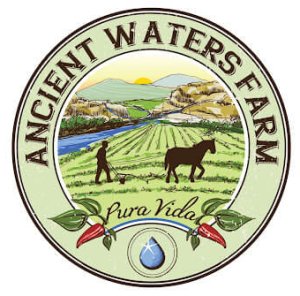
A: Ancient Waters Farm, a family-owned homestead. We currently specialize in sunflower microgreens and herbs, both culinary and medicinal. Our production plan for the 2022 growing season includes leafy greens, peppers, tomatoes, corn, melons, squash, potatoes, pumpkins, garlic and onions.
Q: What is your deeper ‘why’ behind your business or entrepreneurial journey?
A: Locally grown food is healing. In addition to being a farmer, I am a healer and shamanic practitioner. The way I look at it, a good way to create balance in a chaotic world is to have a solid relationship with place, through the land, waters, air, and fire which interact in myriad unique ways to create flavors, nutrients, and medicine!
There are subtle influences surrounding us constantly that are miraculous, including the microscopic world of the soil to the cosmos which informs our seasonal cycles. Food channels all of these energies into nourishment, literally alchemizing the sun, water and other essential elements to fuel our chosen activities on a daily basis.
My experience is that food and plant medicine are a necessary and familiar conduit for the sublime edges of life that generally fall beyond our scope of daily conscious engagement. And by participating in the cultivation of these nourishing allies, I offer a heartfelt service to serve as an energetic exchange through an edible medium for others in my community. Plus, local food tastes great and it's fun to harvest with my family!
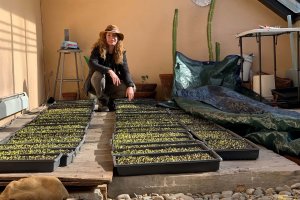 Q: How does being an entrepreneur and ecosystem builder impact each other?
Q: How does being an entrepreneur and ecosystem builder impact each other?
A: Being an agricultural entrepreneur as well as actively working on ecosystem development in the regional food value chain are not only complementary, but a powerful way to create lasting impact on a multitude of levels. You can’t really beat lived experience. It allows for insights and approaches uniquely wrought out of a personal journey to be offered into the creation of a functional system of equitable exchange. I believe this is where the essence of a paradigm shift is born, when people who have walked the walk through entrepreneurship are not only heard but held as experts in shaping the ecosystem.
In our western society, we have tended toward a “thought-legacy” that has created conceptual approaches to address systemic needs. This mind-centric approach is brittle, and fraught with dangers of projecting power-laden and privileged realities onto others whose worldview, priorities, and experience are necessarily different. Don’t get me wrong — brains and critical thinking are important, but in my opinion, it is even more important to slow down and activate space and time for experience to round out the deep thinking, such that a model for change is not simply perpetuating a superficial and patriarchal approach.
As more entrepreneurial leaders bring their consciousness, hearts, and guts to ground the “good ideas” into regionally-wise and cohesive realities, we are bridging entrepreneurialism and ecosystem building in a practical container from which we cultivate trust, courage, shared wisdom, and live in mutual respect. Here, we can and ARE doing justice for the depth and breadth of diversity and potential in the intricate tapestry of our ecosystem.
Q: How can the readers best support your business or entrepreneurial journey right now?
A: Do a self-check. If you find an abundance of focus far out there about things beyond our control that are creating fear or a scarcity-mindset, actively turn your attention “inward” focusing on your region’s unique richness and assets. With regard to food security and equitable access, make a personal choice to experience how nourishment is already cycling through your food community by-way of urban and rural food producers feeding into local processors, aggregators, distributors, wholesale outlets, and institutions. One thing that we have learned in New Mexico is the power of a site visit at any step of the value chain, where one seeks out the places that are actively contributing to your region’s food supply. Simply by showing up and sharing time and space with those pursuing agricultural and food sector work, inspiration and “Ah Ha!” moments arise.
It is impossible to predict what can evolve out of going out of a regular routine to be present in this way. There is beauty in this unknown, as each and every one of you brings a world of experience that may be exactly what is needed to catalyze more connection to fuel resiliency in your food-shed and community. And if you happen to find yourself in Northern New Mexico, come visit Ancient Waters Farm!
